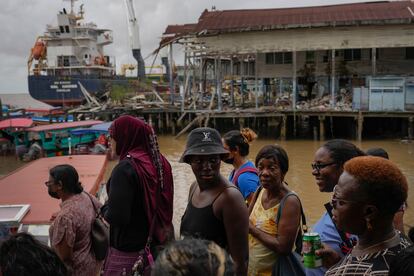US conducts flight operations in Guyana after Venezuela’s referendum on the Essequibo region
Secretary of State Antony Blinken expressed Washington’s support for Guyana’s sovereignty in a conversation with the country’s president, Mohamed Irfaan Ali


The United States announced Thursday that it would conduct a series of joint flight operations with the Guyana Defense Force (GDF) to strengthen security collaboration between the two countries, according to the U.S. Southern Command. The announcement comes in the midst of escalating tensions between Georgetown and Caracas, following the referendum held in Venezuela on sovereignty in the Essequibo region, a territory belonging to the neighboring country and occupying two-thirds of its land.
The maneuvers are routine in nature and seek, in addition to reinforcing cooperation between the two forces, to strengthen regional collaboration, according to the U.S. Southern Command statement. In addition to Thursday’s exercises, the United States “will continue its collaboration with the GDF in the areas of disaster preparedness, aerial and maritime security, and countering transnational criminal organizations.” The U.S., which has been conducting regular joint military exercises with the South American country for years, “will continue its commitment as Guyana’s trusted security partner and promoting regional cooperation and interoperability.”

The maneuvers come a day after U.S. Secretary of State Antony Blinken assured the President of Guyana, Mohamed Irfaan Ali, of Washington’s “unconditional support” for his sovereignty after the Venezuelan referendum. Blinken reiterated the call for a peaceful solution to the dispute between Venezuela and Guyana over the Essequibo, a 160,000 square kilometer sparsely populated jungle that is rich in oil, timber, and minerals and which has been at the base of Guyana’s strong economic growth in recent years.
Venezuela criticized on Wednesday Guyana’s decision to “green light” the presence of the U.S. Southern Command in the Essequibo region. According to President Nicolás Maduro, this attitude opens the “possibility of U.S. military bases” in the region, something that is “threatening” the region’s “peace.”
Caracas argues that the Essequibo had belonged to it during Spanish colonial times and that the judicial decision that awarded it to Guyana in the 19th century is not valid. In 2020, the dispute reached the U.N. International Court of Justice, where it has not been resolved. In any case, Maduro rejects that this court has jurisdiction in the conflict.
In Sunday’s referendum — held after the U.N. Court urged Venezuela not to take measures that would alter Guyana’s control over the Essequibo — 10.4 million Venezuelans voted in favor of Maduro’s thesis. The consequences of that vote immediately contributed to heightened tensions. Maduro announced that his government would draft a law to annex the disputed territory, appointed a provisional authority to administer the region, mobilized the army in the border area, and took advantage of the escalation to accuse some collaborators of opposition leader María Corina Machado of conspiracy.
On Wednesday, Venezuelan Foreign Minister Yván Gil on Wednesday attributed Washington’s interest to U.S. oil company ExxonMobil, to which Guyana granted oil exploitation rights in the waters of the Essequibo. During an event to present what he called the “new map of Venezuela,” Maduro also gave a three-month deadline to the companies that have received concessions from Guyana to stop operating and negotiate again with Caracas.
All of this comes less than two months after Joe Biden’s administration lifted sanctions on Venezuela’s oil, gas, and gold following agreements between the government and the opposition to hold presidential elections in 2024.
Sign up for our weekly newsletter to get more English-language news coverage from EL PAÍS USA Edition
Tu suscripción se está usando en otro dispositivo
¿Quieres añadir otro usuario a tu suscripción?
Si continúas leyendo en este dispositivo, no se podrá leer en el otro.
FlechaTu suscripción se está usando en otro dispositivo y solo puedes acceder a EL PAÍS desde un dispositivo a la vez.
Si quieres compartir tu cuenta, cambia tu suscripción a la modalidad Premium, así podrás añadir otro usuario. Cada uno accederá con su propia cuenta de email, lo que os permitirá personalizar vuestra experiencia en EL PAÍS.
¿Tienes una suscripción de empresa? Accede aquí para contratar más cuentas.
En el caso de no saber quién está usando tu cuenta, te recomendamos cambiar tu contraseña aquí.
Si decides continuar compartiendo tu cuenta, este mensaje se mostrará en tu dispositivo y en el de la otra persona que está usando tu cuenta de forma indefinida, afectando a tu experiencia de lectura. Puedes consultar aquí los términos y condiciones de la suscripción digital.








































